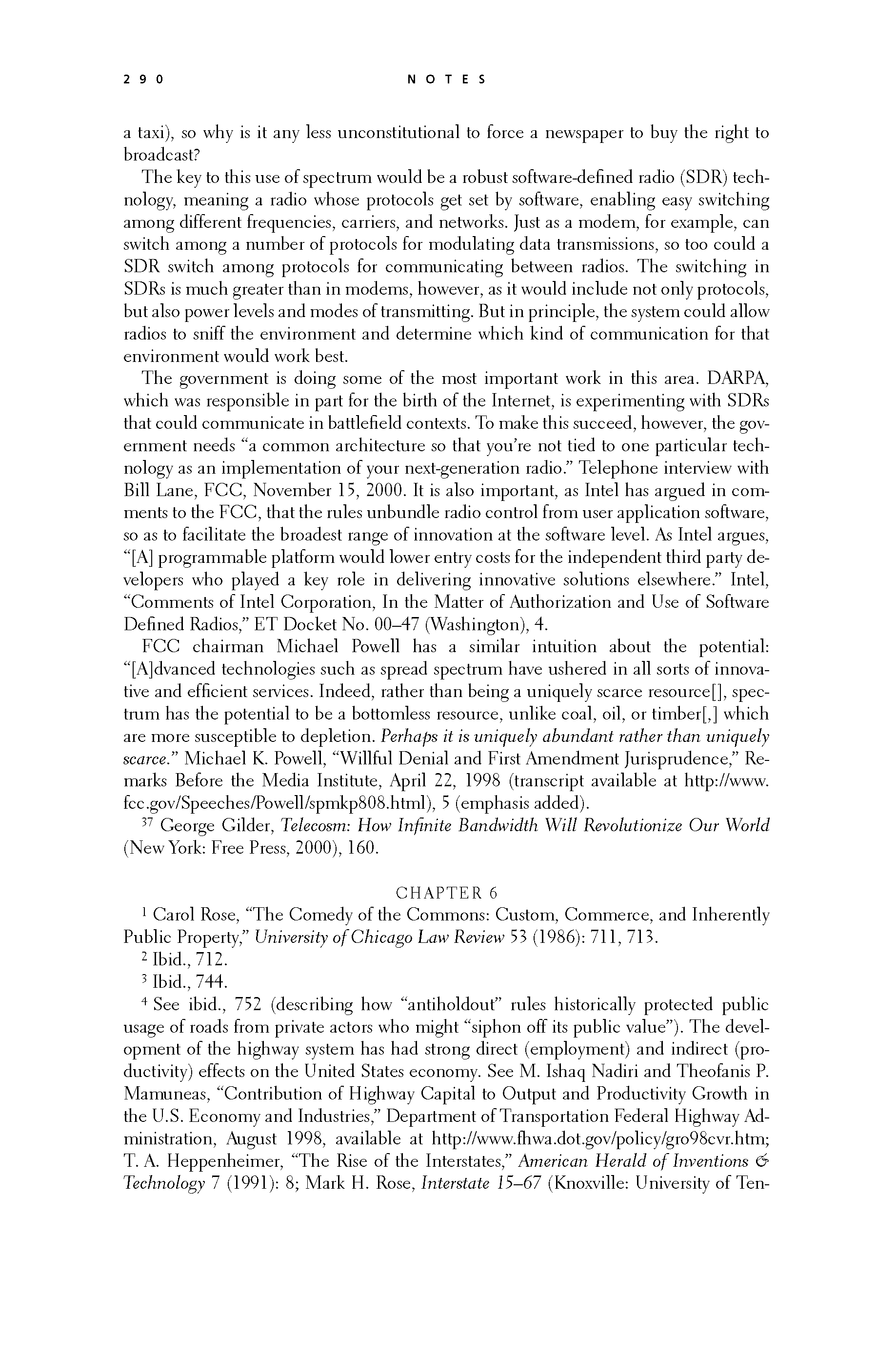 p289 _
-chap- _
toc-1 _
p290w _
toc-2 _
+chap+ _
p291
p289 _
-chap- _
toc-1 _
p290w _
toc-2 _
+chap+ _
p291
a taxi), so why is it any less unconstitutional to force a newspaper to buy the right to
broadcast?
The key to this use of spectrum would be a robust software-defined radio (SDR) tech-
nology, meaning a radio whose protocols get set by software, enabling easy switching
among different frequencies, carriers, and networks. Just as a modem, for example, can
switch among a number of protocols for modulating data transmissions, so too could a
SDR switch among protocols for communicating between radios. The switching in
SDRs is much greater than in modems, however, as it would include not only protocols,
but also power levels and modes of transmitting. But in principle, the system could allow
radios to sniff the environment and determine which kind of communication for that
environment would work best.
The government is doing some of the most important work in this area. DARPA,
which was responsible in part for the birth of the Internet, is experimenting with SDRs
that could communicate in battlefield contexts. To make this succeed, however, the gov-
ernment needs "a common architecture so that you're not tied to one particular tech-
nology as an implementation of your next-generation radio." Telephone interview with
Bill Lane, FCC, November 15, 2000. It is also important, as Intel has argued in com-
ments to the FCC, that the rules unbundle radio control from user application software,
so as to facilitate the broadest range of innovation at the software level. As Intel argues,
"[A] programmable platform would lower entry costs for the independent third party de-
velopers who played a key role in delivering innovative solutions elsewhere." Intel,
"Comments of Intel Corporation, In the Matter of Authorization and Use of Software
Defined Radios," ET Docket No. 00-47 (Washington), 4.
FCC chairman Michael Powell has a similar intuition about the potential:
"[A]dvanced technologies such as spread spectrum have ushered in all sorts of innova-
tive and efficient services. Indeed, rather than being a uniquely scarce resource[], spec-
trum has the potential to be a bottomless resource, unlike coal, oil, or timber[,] which
are more susceptible to depletion. _Perhaps_it_is_uniquely_abundant_rather_than_uniquely_
_scarce._" Michael K. Powell, "Willful Denial and First Amendment Jurisprudence," Re-
marks Before the Media Institute, April 22, 1998 (transcript available at http://www.
fcc.gov/Speeches/Powell/spmkp808.html), 5 (emphasis added).
[5-37] George Gilder, _Telecosm:_How_Infinite_Bandwidth_Will_Revolutionize_Our_World_
(New York: Free Press, 2000), 160.
Chapter 6
[6-1] Carol Rose, "The Comedy of the Commons: Custom, Commerce, and Inherently
Public Property," _University_of_Chicago_Law_Review_ 53 (1986): 711, 713.
[6-2] Ibid., 712.
[6-3] Ibid., 744.
[6-4] See ibid., 752 (describing how "antiholdout" rules historically protected public
usage of roads from private actors who might "siphon off its public value"). The devel-
opment of the highway system has had strong direct (employment) and indirect (pro-
ductivity) effects on the United States economy. See M. Ishaq Nadiri and Theofanis P.
Mamuneas, "Contribution of Highway Capital to Output and Productivity Growth in
the U.S. Economy and Industries," Department of Transportation Federal Highway Ad-
ministration, August 1998, available at http://www.fhwa.dot.gov/policy/gro98cvr.htm;
T. A. Heppenheimer, "The Rise of the Interstates," _American_Herald_of_Inventions_&_
_Technology_ 7 (1991): 8; Mark H. Rose, _Interstate_15-67_ (Knoxville: University of Ten-
[[290]]
p289 _
-chap- _
toc-1 _
p290w _
toc-2 _
+chap+ _
p291